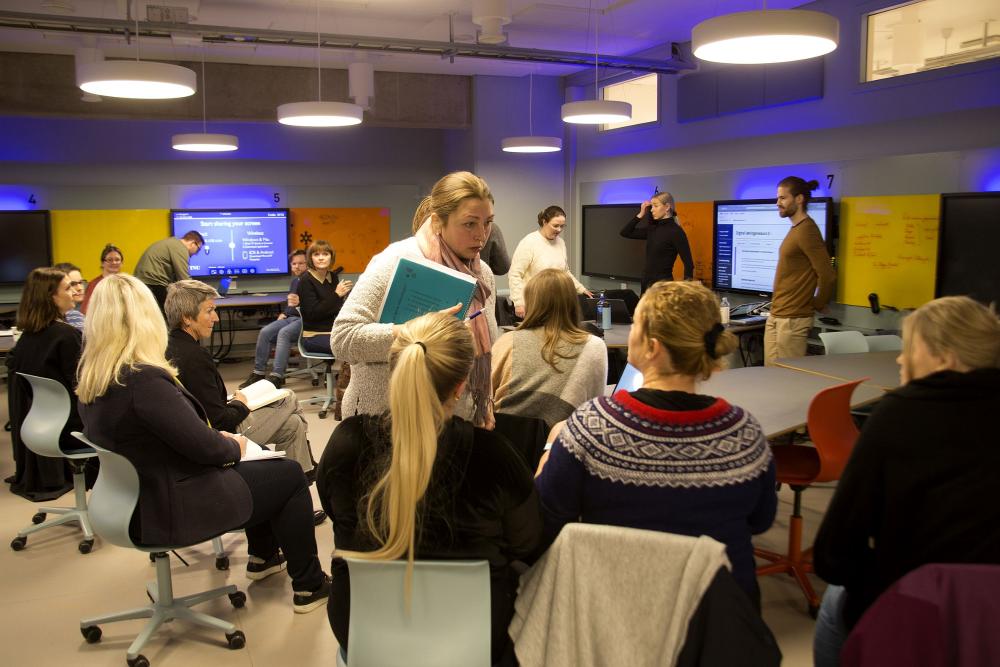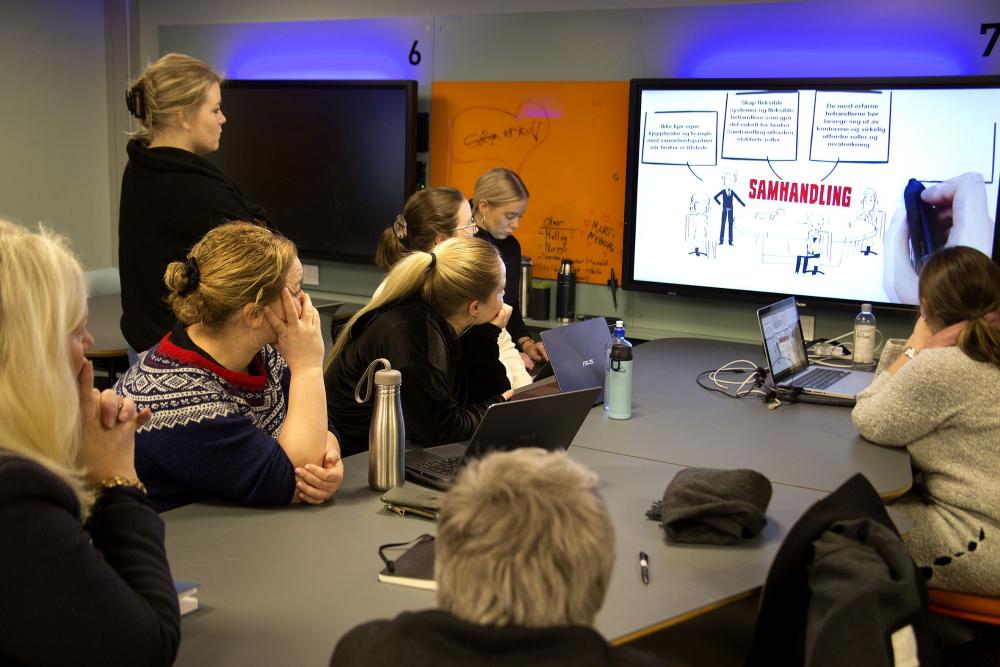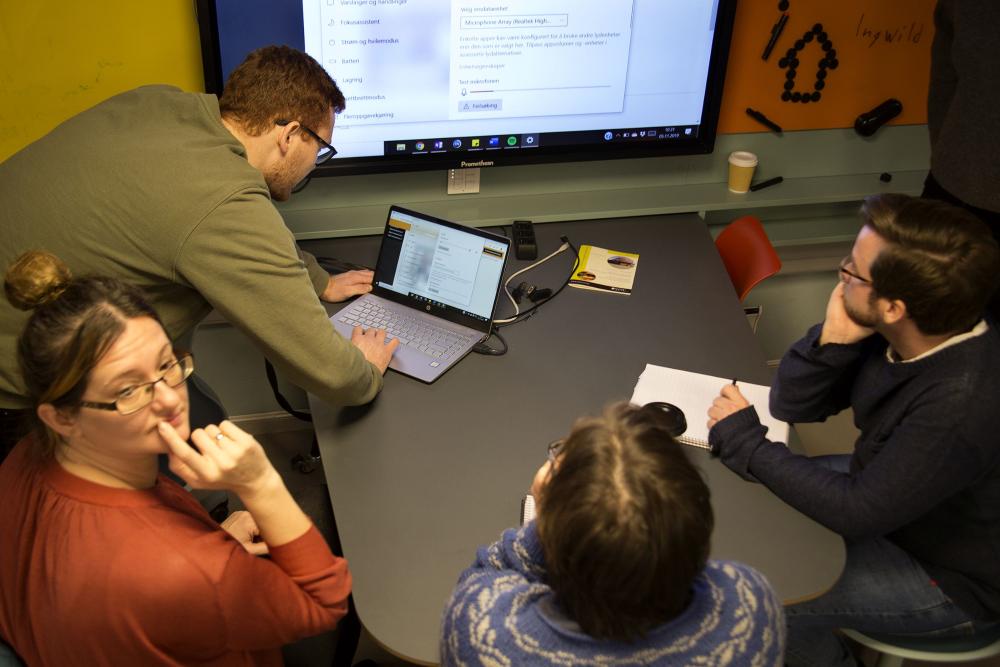Conditions for learning in higher education and work – COOL – Forskning – Institutt for pedagogikk og livslang læring
COOL - Conditions for learning and innovation in higher education and work
The research group COOL explores conditions for learning in higher education and work. What adults need or want to learn, which opportunities that are available, and the way they learn are determined by their sociocultural context. Adults find themselves in a sociocultural context influenced by the three main forces demography, technology and globalization. Continuous changes influence learning needs throughout the life span in general and in particular the learning needs in higher education and work.
The research group addresses new approaches to learning in higher education, as well as the design of teaching practices that meet needs in workplaces. The relation between learning and innovation is also studied (i.e. knowledge sharing and employee-driven innovation (EDI) in the workplace).
Prosjekter og publikasjoner
1. #Student-driven innovation. #Studentaktiv - Studenter som designere, produsenter og brukere av hverandres digitale læringsressurser
Ongoing
Funding:
- Norwegian Agency for International Cooperation and Quality Enhancement in Higher Education (DIKU)
Collaborating Partners:
- OsloMet – Oslo Metropolitan University
2. #Læringslivet. Learning life as Symbiotic Learning System of Employee-driven Innovation in Municipal Care Work
Ongoing
Funding:
- Norwegian Research Council, NFR (FINNUT)
Collaborating Partners:
- OsloMet – Oslo Metropolitan University
- The Norwegian Labour and Welfare Service, NAV Work-Life Center
3. Seniors and ICT
Ongoing
Funding:
- Faculty of Social and Educational Sciences, NTNU.
Collaborating Partners:
- Seniornett Norge
4. Knowledge development for, with and within The Norwegian Educational Psychological Services (EPS). (Kunnskapsutvikling for, med og i Pedagogisk psykologisk tjeneste, PPT). Ongoing
Funding:
- Norwegian University of Science and Technology, NTNU
Collaborating Partners
- Aalborg University, Denmark
5. Conditions for learning and the use of ICT in higher education and work
Ongoing
Five studies:
- #Student-driven-innovation (#Studentaktiv - Studenter som designere, produsenter og brukere av hverandres digitale læringsressurser)
- M-learning in Sociology
- M-learning in Biology
- Learning Management Systems in future learning environments (teacher education)
- ICT-supported postgraduate education for the energy sector
Funding:
- Norwegian Agency for International Cooperation and Quality Enhancement in Higher Education
- Norway Opening Universities
- Network for IT Research and Competence in Education, ITU
- NTNU: Faculty of Social and Educational Sciences and Department of Education and Lifelong Learning
- Industry partners
Collaborating Partners:
- Oslo Metropolitan University, OsloMet
- Department of Biology, NTNU
- Department of Sociology, NTNU
- Department of Teacher Education, NTNU
- Department of Electrical Engineering, NTNU
- Multimedia Centre, NTNU
- Industry partners
- The developers of the Learning Management System “It’s learning”
6. Knowledge sharing & learning in organizations
Ongoing
Two studies:
- Knowledge sharing among teachers in schools
- Knowledge sharing among employees who return from post-graduate education and their colleagues (ongoing)
Funding:
- Norwegian Research Council, NFR
- Norway Opening Universities
- Industry partners
Collaborating Partners:
- Trondheim Municipality
- South-Trøndelag University College
- Nord University
- The Norwegian SmartGrid Center
- Department of Electrical Engineering
- Industry partners
7. Online Education – motives, mastery and ambitions
Funding:
- Flexible Education Norway (FUN)
8. Conditions for learning in driver education
Ten studies:
- Cultural diversity in driver education
- Learning effectiveness in theory courses in driver education
- Analysis of plan documents in driver education
- The role and efforts of language interpreters in driver education
- Learning effectiveness in skidpan driving courses
- Developing teaching competences in driver education
- Personality traits as a basis for adapted driver education
- Theory and practice in driver education
- Learning effectiveness in the basic course in driver education
- Immigrants and Road Accidents
Funding:
- The Norwegian Public Roads Administration.
- Institute of Transport Economics.
9. Adult students in flexible, higher education
Funding:
- The Ministry of Education and Research (UFD)
- Norway Opening Universities
Collaborating Partners:
- The Arctic University of Norway, UIT
- Uppsala University
- University of Agder
- University of Aalborg
10. Employee-Driven Innovation
Funding:
- Norwegian Ministry of Industry and Trade
Collaborating Partners:
- NTNU Social Research Ltd, Studio Apertura
- International Research Centre of Stavanger (IRIS)
11. Innovation and Centre Development in BIGCCS
Funding:
- Norwegian Research Council
- Industry partners
Collaborating Partners:
- NTNU Social Research Ltd, Studio Apertura
- SINTEF Energy Research
- Industry Partners
12. Collaboration, Management and Development in Ocean Space Centre
Funding:
- The Norwegian Marine Technology Research Institute (MARINTEK)
13. Conditions for successful human resource development projects in the workplace
Funding:
- Vox – National Institute for Adult Learning
- Rønning, W. M. & Sølvberg, A. M. (2020). Digitalt medborgerskap: Seniorers erfaringer med arenaer for læring av digital teknologi. Tidsskrift for velferdsforskning, 23(4), s. 222-236.
- Amble, N.; Amundsen, O.; Johansen, E. M.; Rismark, M. (2020). Når arbeidet blir skole og skolen blir arbeid. I: Medarbeiderdrevet innovasjon. Gyldendal Akademisk
- Amundsen, O.; Amble, N.; Rismark, M. (2020). Innovasjon som fenomen og praksis. I: Medarbeiderdrevet innovasjon. Gyldendal Akademisk.
- Amundsen, O.; Rismark, M. (2020). Økt innovasjonskapasitet gjennom kulturell endring. I: Medarbeiderdrevet innovasjon. Gyldendal Akademisk.
- Rismark, M.; Amundsen, O. (2020). Omsorgsarbeidere i ekspansivt læringsmiljø. I: Medarbeiderdrevet innovasjon. Gyldendal Akademisk.
- Moen, T., Rismark, M., Sølvberg, A. M. (2020). Rådgiverrollen i pedagogisk-psykologisk tjeneste (PPT): hvordan blir den forstått av PP-rådgivere? Psykologi i kommunen 2020 (2).
- Sølvberg, A. & Rismark, M. (2019). Steps towards developing a Digital Reading Workshop. In K. Graziano (Ed.), Proceedings of Society for Information Technology & Teacher Education International Conference (pp. 2054-2057). Las Vegas, NV, United States: Association for the Advancement of Computing in Education (AACE).
- Sølvberg, A. M., Moen, T., Rismark, M., & Tveit, A. (2019). Immediate and direct links from university course content to participants’ work practice: A study of Norwegian educational-psychological counsellors’ reflection logs in a post-graduate education program, Nordic Studies in Education, 39(4), pp. 281-293.
- Rismark, M. & Sølvberg, A. M. (2019). Video as a learner scaffolding tool. International Journal of Learning, Teaching and Educational Research, 18(1), 62-75.
- Moen, T., Rismark, M., Samuelsen, A-S. & Sølvberg, A. M. (2018). The Norwegian Educational Psychological Service: A systematic review of research from the period 2000-2015. Nordic Studies in Education, 38(2), 101-117.
- Rønning, W.M. & Sølvberg, A.M. (2017). Older Adults’ Coping with the Digital Everyday Life. International Journal Media, Technology and Lifelong Learning, 13 (2).
- Hansen, K., Amundsen, O., Aasen, T.M, & Gressgård, L. J. (2017). Management practices for promoting employee-driven innovation, in Pot et al. (eds.) Workplace Innovation: Theory, Research and Practice, Springer publishing [in press].
- Rønning, W. M (2017). The Curse of Dropout from Distance Education - what is it about? A study of Motives and Mastery among Distance Education Students in Norway. Proceedings EAPRIL 2016, 3, pp. 313-327.
- Sølvberg, Astrid M. & Rismark, M. (2016). Designing teaching practice in post-graduate education. Creative Education.,7 (12).
- Amundsen, O. & Kongsvik, T. (2016). Endringskynisme. Og kunsten å skape god endringspraksis. [Change Cynicism. And the art of creating change practices]. Oslo: Gyldendal Akademisk.
- Aasen, T.M. & Amundsen, O. (2015). Innovasjonsarbeid. Organisasjon, kultur og ledelse [Innovation Work. Organization, Culture and Management]. Oslo: Gyldendal Akademisk [translated to Danish 2016].
- Sølvberg, A. M. & Rismark, M. (2014). A Postgraduate Course for Engineers Finds its Form. International Journal of Innovation, Creativity and Change. vol. 1 (3).
- Amundsen, O., Aasen, T.M. Gressgård, L.J., & Hansen, K. (2014). Preparing organisations for employee-driven open innovation. International Journal of Business Science and Applied Management, vol. 9, iss.1, pp. 24-35.
- Amundsen, O. (2014). Stories and scripts as ‘cultural constraints’ on change in organisations. International Journal of Learning and Change, vol. 7, (3), pp. 197-210.
- Gressgård, L.J., Amundsen, O., Aasen, T.M. & Hansen, K. (2014). Use of information and communication technology to support employee-driven innovation in organizations: a knowledge management perspective. Journal of Knowledge Management, 18 (4), pp. 633 - 650.
- Aasen, T.M. & Amundsen, O. (2013). Innovation som kollektiv prestation [Innovation as a collective achievement]. Lund: Studentlitteratur.
- Amundsen, O., Kongsvik, T., Olsen, H.H. & Munkvold, G. (2013). Kriterier for gjennomføring av planlagte endringsprosesser. En eksplorerende casestudie [Criteria for Implementation of Planned Change Processes: An exploratory case study]. Nordiske Organisasjonsstudier [Journal: Nordic Organization Studies], 15(1), pp. 3-28.
- Sølvberg A. M., Rismark, M. (2012). Learning spaces in mobile learning environments. Active Learning in Higher Education, 13(1), 23-33.
- Aasen, T.M., Amundsen, O., Gressgård, L.J. & Hansen, K. (2012). Employee-Driven Innovation in Practice – Promoting Learning and Collaborative Innovation by tapping into diverse Knowledge Sources. Journal: Lifelong Learning in Europe, 18(4).
- Aasen, T.M., Amundsen, O., Gressgård, L.J. & Hansen, K. (2012). In Search of Best Practices for Employee-Driven Innovation: Experiences from Norwegian Work Life, In Høyrup, S., Bonnafous-Boucher, M., Hasse, C., Lotz, M., Møller, K. (eds.). Employee-Driven Innovation: A New Approach, New York: Palgrave Macmillan, pp. 57-74.
- Amundsen, O. & Kongsvik, T. (2012). Fallgruver i gjennomføring av planlagte organisasjonsendringer [Pitfalls in Implementation of Planned Organizational Change].
- Rønning, W. M & Grepperud, G. (2012). Familjen som studiemiljö. I: Familjeliv och lärande. Studentlitteratur AB 2012 ISBN 978-91-44-07809-0. s. 123-146.
- Samfunn, økonomi og politikk [Journal: Society, economy and politics], vol.1, iss.1, pp. 18-33.
- Aasen, T.M. & Amundsen, O. (2011). Innovasjon som kollektiv prestasjon [Innovation as a collective achievement]. Oslo: Gyldendal Akademisk [Translated to Swedish in 2013].
- Amundsen, O., Gressgård, L.J., Hansen, K. & Aasen, T.M. (2011). Medarbeiderdrevet innovasjon – en kunnskapsstatus [Employee-Driven Innovation – A Knowledge Status]. Søkelys på arbeidslivet [Journal: Focus on Work-life], vol.28, iss.3, pp. 212-231.
- Rismark, M. & Sølvberg, A. (2011). Knowledge sharing in schools; a key towards developing professional learning communities. World Journal of Education, 1 (2), 150-161.
- Rønning, W.M & Grepperud, G. (2011) Undervisning av voksne - en arena for amatører eller profesjonelle? En analyse av holdninger til voksenlæreres kompetanse. I: Voksne, læring og kompetanse. Gyldendal Akademisk, ISBN 978-82-05-41680-2. s. 172-196.
- Rismark, M. & Sølvberg, A. (2010). Dialogen som redskap i læring [The dialogue as a learning tool]. In E. Haaland, C. Tønseth, S. Tøsse & L. Assarsson Aarsand S. (Eds.). Voksne, læring og kompetanse. Oslo: Gyldendal.
- Amundsen, O., Kongsvik, T., Munkvold, G., Olsen, H.H. (2010). Forbedring av samarbeidsevnen i store organisasjoner: ’Paradoksal-dynamisk tilnærming’ som strategi [Improving Cooperation in Large Organizations: A 'Paradoxical-dynamic’ Approach]. Søkelys på arbeidslivet [Journal: Focus on Work-life], vol.27, iss.4, pp. 310-327.
- Rønning, W.M; Johansen, K. Bye & Finbak, L. (2010)."Servert på sølvfat"? Studiekvalitet i høyere utdanning - slik studenter ser det. UNIPED (Tromsø), 33 (2) s. 50-59.
- Sølvberg, A. M. & Rismark, M. (2009). Use of Technology in Education: Didactic Challenges. In R.Krumsvik (Ed.): Learning in the Network Society and the Digitized School. New York: Nova Science Publishers, Inc. 2009 ISBN 978-1607411727. pp. 141-153.
- Rismark, M. & Sølvberg, A. M. (2009) Hvordan bidra til utvikling i skolen. [How to promote school development]. In T.Steen-Olsen & M.B. Postholm (Eds). Å utvikle en lærende skole. Aksjonsforskning og aksjonslæring i praksis. Bergen: Høyskoleforlaget . pp. 119-127.
- Sølvberg, A. M. & Rismark, M. (2009). Kunnskapsdeling i skolefellesskap. [Knowledge sharing in school communities]. I T.Steen-Olsen & M.B. Postholm (Eds): Å utvikle en lærende skole. Aksjonsforskning og aksjonslæring i praksis. Bergen: Høyskoleforlaget 2009 ISBN 9788276347876. s. 107-117.
- Rønning, W. M. (2009) Adult, Flexible Students' Approaches to Studying in Higher Education. Scandinavian Journal of Educational Research, 53 (5) pp. 447-460.
- Rønning, W. M. (2008). Tidsbruk og tidsstyring i fleksible studier - en utfordring for voksne studenter. Nordisk Pedagogik, 28(2) s. 104-122.
- Sølvberg, A.M. & Rismark, M. (2008). Cultural Diversity in Driver Education. In A. De Smet (Ed). Transportation Accident Analysis and Prevention. New York: Nova Science Publishers, Inc.
- Sølvberg A.M., Rismark, M., & Strømme, A. (2008) Fra skippertak til jevn studieinnsats; mobiltelefon som støttespiller i læringsarbeidet. Uniped, 31 (1), 25-38.
- Rismark, M. & Sølvberg A.M. (2007). Effective dialogues in driver education. Accident Analysis and Prevention, 39(3), 600-605.
- Rismark, M. & Sølvberg A.M., Strømme, A. & Hokstad, L.M. (2007) Using Moblie phones to prepare for university lectures: student experiences. The Turkish Online Journal of Educational Technology TOJET, 6(4), 85-90.
- Sølvberg. A. M., Rismark, M., Strømme, A. & Hokstad, L. M. (2007). How mobile technology promotes effective learning. Computers and advanced technology in education. Anaheim/Calgary/Zurich: ACTA Press, pp. 475-481.
- Rønning, W. M; Grepperud, G. (2006).The Everyday Use of ICT in Norwegian Flexible Education. Seminar.net: Media, technology and lifelong learning, 2 (1) pp.1 -16.
Medlemmer i forskningsgruppe
-
Oscar Amundsen Professor i organisasjonsforskning
+4791897206 oscar.amundsen@ntnu.no Institutt for pedagogikk og livslang læring -
Torill Moen Professor emerita
+4799041690 torill.moen@ntnu.no Institutt for pedagogikk og livslang læring -
Marit Rismark Professor
73592856 marit.rismark@ntnu.no Institutt for pedagogikk og livslang læring -
Maiken Spjelkevik Stipendiat
+4791351201 maiken.spjelkevik@ntnu.no Eksperter i team
Eksternt medlem
Else Marie Johansen, førsteamanuensis, OsloMet



